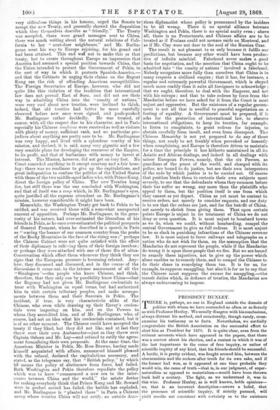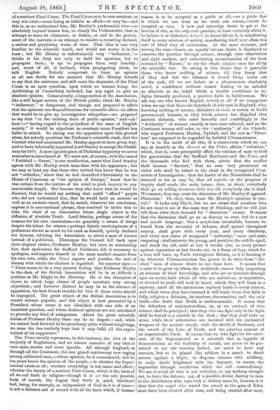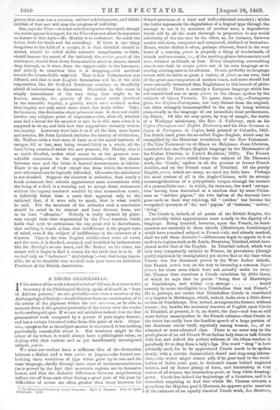PRESIDENT HUXLEY.
THERE is, perhaps, no one in England outside the domain of politics with whom we have contended so often or so fiercely as with Professor Huxley. We usually disagree with his conclusions, always distrust his method, and occasionally, though rarely, cross- examine his testimony as to facts. Nevertheless, we cordially congratulate the British Association on the successful effort to elect him as President for 1870. It is quite clear, even from the reticent accounts which have appeared in the papers, that there was a contest about his election, and a contest in which it was of the last importance to the cause of free inquiry, or rather of scientific inquiry of any kind, that his friends should be successful. A battle, it is pretty evident, was fought around him, between the obscurantists and the seekers after truth for its own sake, and if the former had won, as it appeared at one time probable they would win, the cause of truth —that is, in our judgment, of super- naturalism as opposed to materialism—would have been thrown back half a century. The fight, as we understand it, was in this wise. Professor Huxley, as is well known, holds opinions— no, that is an incorrect description—avows a belief, that the processes of scientific inquiry, if strictly pursued, will yield results not consistent with certainty as to the existence of a sentient Final Cause. The Final Cause may be non-sentient, or may not exist—cause being as infinite as effect—or may be—and this is, as we understand him, Mr. Huxley's preferential view—so absolutely beyond human ken, so clearly the Unknowable, that to attempt to trace its character, or wishes, or end in the govern- ment of the universe is an attempt to resolve a recurring decimal, a useless and perplexing waste of time. That idea is one very familiar to the scientific world, and would not worry it in the least ; but Mr. Huxley is unfortunately very " indiscreet,"— thinks it his duty not only to hold his opinions, but to propagate them ; is apt to propagate them very forcibly ; and, worst of all, is inclined, when propagating them, to talk English. Nobody competent to form an opinion at all can doubt for one moment that Mr. Huxley intends to say that the existence, and still more the character, of the Final Cause is an open question, upon which no human being, the Archbishop of Canterbury included, has any right to give an absolute opinion. Consequently, a large section of the Association, like a still larger section of the British public, think Mr. Huxley "indiscreet," or dangerous, and though not prepared to affirm that his opinions are disqualifications for scientific office—to affirm that would be to give up investigation altogether—are prepared to say that "in the existing state of public opinion," and—ah ! hum!—" having regard to the prejudices of the mass of English society," it would be expedient to nominate some President less liable to attack. So strong was the opposition upon this ground alone, for nobody questions the Professor's scientific rank, that the Council who had nominated Mr. Huxley appear to have given way, and to have informally requested Lord Stanley to accept the Presid- ency for 1870. A more ignoble piece of Philistine hypocrisy we never remember to have heard of. We must not, of course, with the case of " Faithfull v. Grant," in our recollection, assert that Lord Stanley agrees with Mr. Huxley much more than with his opponents ; but we may at least say that those who invited him knew that he was not "orthodox," knew that he had described Christianity in the House of Commons as "the opinion of Europe," knew that he was certain from the texture of his mind to push inquiry to any conceivable length. But because they also knew that he would be discreet, that he would say nothing that could " offend " people who did not understand him, that he would hold an esoteric as well as an exoteric creed, that he would, whatever his conclusion, express it in conventional phrase, they resolved to invite him to take the chair of an Association whose single object is the diffusion of absolute Truth. Lord Stanley, perhaps aware of the reasons for his own nomination—he generally is aware of things despite his talent for silence—perhaps faintly contemptuous of a preference shown as much to his rank as himself, quietly declined the honour, advising the Association to select a man of science instead of a politician. Thereupon the Council fell back upon their original choice, Professor Huxley, but even in nominating him their spokesman Sir Stafford Northcote felt it necessary to apologize, and separate himself in the most marked meaner from his own vote, while the Times reports and justifies the sort of dismay with which the election is regarded. Its reporter says :— " There seems to be a very general feeling that Professor Huxley in the chair of the British Association will be in as difficult a position as Mr. Bright in the Ministry. He is the champion of views to which large classes of people entertain very strong objections ; and however discreet he may be in the absence of
opposition, his best friends tremble for him if those views should be impugned. The great object of the British Association is to render science popular, and this object is best promoted by a President whose name is not identified with one side of an unsettled question, and whose declared opinions are not calculated to provoke any kind of antagonism. About the great scientific claims of Professor Huxley there can be no dispute ; and, while we cannot look forward to his presidency quite without misgivings, we none the less cordially hope that it may fulfil all the expec- tations of his supporters."
The Times exactly represents, in this instance, the idea of the majority of Englishmen, and we cannot conceive of any idea at
once more unwise and more ignoble. All through England, as through all the Continent, the one grand controversy now raging among cultivated men,—whose opinion, be it remembered, will be ten years hence the opinion of the people,—is whether the Super-
natural exists at all ; whether everything is not cause and effect; whether the theory of a sentient First Cause, which is the basis of all we call faith or religion—though it is /tot the sole possible basis of morals, the dogma that truth is good, falsehood bad, being, for example, as independent of God as it is of man- ia WA a deluion. QU Qf ACectrci with all tW facta which, if human reason is to be accepted as a guide at all,—as a guide that is which we can trust as we trust our senses,—must be accepted as true. A new and sovereign desire to get at the bottom of this, as the only real question, to have certainty about it, to believe it Or disbelieve it hard, to frame life on it, is manifesting itself in every stratum of society, manifesting itself very often in a sort of blind fury of enthusiasm. At the same moment, and among the same classes, an equally intense desire is displayed to examine the question through science, through close observation and rigid analysis, and unhesitating recombination of the facts revealed by "Nature," to try the whole subject once for all by the scientific test. So strong is this desire that it pervades those who know nothing of science, till they fancy that if they had but the talisman it would bring water out of the rock, till we see before us a phenomenon absolutely novel, a confidence without reason leading to an unbelief as absolute as the belief which a similar confidence in re- ligion formerly produced, a positive faith in faithlessness. We ask any one who knows English society at all if we exaggerate when we say that there are hundreds of able men in England, who, knowing nothing of science, disbelieve in God, or rather in God's government, because, as they think, science has dispelled that ancient delusion, who refer honestly and confidingly to the " Authority " of science exactly as men once referred, and on the Continent women still refer, to the " authority " of the Church, who regard Professors Huxley, Tyndall, and the rest as "Direc- tors" are supposed to be regarded by faithful Ultramontanes.
It is in the midst of all this, of a controversy which we can say, as heartily as the Record or the Tablet, affects "salvation," which, that is, must perceptibly affect the relation of man to God for generations, that Sir Stafford Northcote and the Times, and the thousands who feel with them, advise that the conflict shall become "discreet," that no man very prominent on either side shall be raised to the chair in the recognized Com- mittee of Investigation ; that the leader of the Naturalists shall be silenced so far as may be, that all reports on the progress of inquiry shall evade the main issues ; that, in short, everybody shall go on telling decorous little lies till everybody else is dead. We cannot, they say, trust the discretion of Mr. Huxley if opposed. Discretion! Do they, then, want Mr. Huxley's opinions to pre- vail ? It looks very like it, but we are aware that numbers who do not want it are of the same way of thinking, and we will just tell them what their demand for " discretion " means. It means that the discussion shall go on as fiercely as ever, but in a new and occult language ; that a scepticism irresistible, because re- leased from the necessity of defence, shall spread throughout society, shall grow with every year, and every discovery, and every new claim of unopposed "authority," more and more unsparing ; shall saturate the young, and paralyze the middle-aged, and shock the old, until at last it breaks out, as every protest against repression at last breaks out, in a flame of fury, which for a time will burn up Faith throughout Britain, as it is burning it up wherever Ultramontanism has power to do what these " dis- creet " men of science desire to see done here. It means that a caste is to grow up whom the multitude cannot help respecting on account of their knowledge, and who are to transmit through ages an occult faith which all who are ambitious, or inquisitive, or devoted to truth will seek to know, which they will learn as a mystery, amid all the attractions mystery lends to every science, and which when they have learned it will teach them that faith is folly, religion a delusion, its teachers obscurantists, and the only truth—the truth that Truth is undiscoverable. It means that the defenders of supernaturalism, or, as we contend, of true science, shall be paralyzed ; that they who can fight only in the light shall be forced to a combat in the dusk ; that they shall have no arms, while their adversaries are invested with the enchanted weapons of the ancient creeds, with the shield of Darkness, and the sword of the Love of Truth, and the jointless armour of an impenetrable Faith. It means that we who fight for the exist- ence of the Supernatural as a scientific fact as capable of demonstration as the fusibility of metals, are never to be per- mitted to see our enemies, indeed, are never to have any enemies, but to be placed like soldiers in a marsh to shoot arrows against a blight, to disperse miasma with artillery, to make shade brightness with the bayonet, to secure the impossible through conditions which are self - contradictory. We are to avoid all that is not orthodox, to say nothing straight out, to leave the defence, say, of a possible divine destiny in man to the Archdeacon who says such a destiny must be, because it is clear that the angel who waved the sword at the gate of Eden must have been created after man, and being created after man,
proves that man was a creation, and not a development, and thinks rubbish of that sort will stop the progress of infidelity.
But, says the Times—it is not merely areporter who says it, though the words appear in a report, for the Times does not allow its reporters to lecture in that style—Mr. Huxley is so indiscreet. So much the better, both for truth and for orthodoxy. If there is one thing dangerous to the faith of a people, it is that disbelief should be hinted, should be veiled under sarcastic compliments to faith, should become the secret of the initiated, the arriere pens& of the cultivated, should filter down from mind to mind in silence, should drop through, as it were, from the supper-table to the basement, and nobody be conscious that it is dropping,—till accident reveals the irremediable mischief. That is how Voltarianism was diffused, and that is how English Secularism will be, if the able respectables like Sir Stafford Northcote continue so dreadfully afraid of indiscretions in discussion. Discretion in this sense is simply concealment of the very thing that ought to be known, namely, the gravity of the moral result involved in the scientific inquiry, a gravity which once realized makes that inquiry not only much more exact, but much wider. Take, for instance, this discussion about primeval man. It does not really involve any religious point of importance—for, after all, whether man had a lemur for his ancestor or not, he is still man—but it is supposed to do so, and look how that supposition instantly widens the inquiry. Lawrence went into it as if all the data were bones and muscles, Sir John Lubbock includes the history of civilization, Mr. Wallace adds a vast mass of facts as to the moral instincts of savages, till at last, man being treated fairly as a whole, all the facts being examined under the new pressure, Mr. Huxley, who is so much dreaded, makes what seems to us the greatest con- ceivable concession to the supernaturalists,—that the chasm between man and the brute is beyond measurement, is infinite. There is no point of view except one from which the reticence now advocated can be logically defended. Of course the unbeliever is not shocked. Suppose the observer is orthodox, then surely a frank statement that certain appearances seem inconsistent with the being of a God, is a warning not to accept those statements without the inquiry rendered needful by that tremendous result, is infinitely better than a mere hint apparent only to the initiated that, if it were safe to speak, that is what would be said. For the interests of the orthodox such a conclusion should be sated in its clearest and least discreet form, not in its least "offensive." Nobody is really injured by plain- ness except that class represented by the Times' reporter, which holds that next to enthusiasm the one great evil is disturbance, that nothing is worth a fuss, that indifference is the proper state of mind, even if the subject of indifference is the existence of a Creator. That is the true English middle-class state of mind, and the more it is shocked, annoyed, and horrified by indiscretions like Mr. Huxley's on one hand, and Mr. Stokes' on the other, the sooner will it begin to find a reason for the faith that is in it. If we had only an " indiscreet " Archbishop !—but that being impos- sible, let us be thankful that we shall next year have an indiscreet President of the British Association.
































 Previous page
Previous page